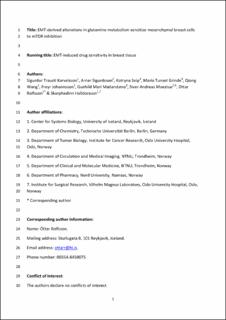| dc.contributor.author | Karvelsson, Sigurdur | |
| dc.contributor.author | Sigurdsson, Arnar | |
| dc.contributor.author | Seip, Kotryna | |
| dc.contributor.author | Grinde, Maria Tunset | |
| dc.contributor.author | Wang, Qiong | |
| dc.contributor.author | Johanssson, Freyr | |
| dc.contributor.author | Mælandsmo, Gunhild Mari | |
| dc.contributor.author | Moestue, Siver Andreas | |
| dc.contributor.author | Rolfsson, Ottar | |
| dc.contributor.author | Halldórsson, Skarphédinn | |
| dc.date.accessioned | 2022-03-04T08:38:54Z | |
| dc.date.available | 2022-03-04T08:38:54Z | |
| dc.date.created | 2021-05-21T11:45:53Z | |
| dc.date.issued | 2021 | |
| dc.identifier.issn | 1541-7786 | |
| dc.identifier.uri | https://hdl.handle.net/11250/2982990 | |
| dc.description.abstract | Epithelial-to-mesenchymal transition (EMT) is a fundamental developmental process with strong implications in cancer progression. Understanding the metabolic alterations associated with EMT may open new avenues of treatment and prevention. Here we used 13C carbon analogs of glucose and glutamine to examine differences in their utilization within central carbon and lipid metabolism following EMT in breast epithelial cell lines. We found that there are inherent differences in metabolic profiles before and after EMT. We observed EMT-dependent re-routing of the TCA-cycle, characterized by increased mitochondrial IDH2-mediated reductive carboxylation of glutamine to lipid biosynthesis with a concomitant lowering of glycolytic rates and glutamine-dependent glutathione (GSH) generation. Using weighted correlation network analysis, we identified cancer drugs whose efficacy against the NCI-60 Human Tumor Cell Line panel is significantly associated with GSH abundance and confirmed these in vitro. We report that EMT-linked alterations in GSH synthesis modulate the sensitivity of breast epithelial cells to mTOR inhibitors. | en_US |
| dc.language.iso | eng | en_US |
| dc.publisher | American Association for Cancer Research | en_US |
| dc.title | EMT-derived alterations in glutamine metabolism sensitize mesenchymal breast cells to mTOR inhibition | en_US |
| dc.type | Peer reviewed | en_US |
| dc.type | Journal article | en_US |
| dc.description.version | acceptedVersion | en_US |
| dc.rights.holder | This is the authors' accepted manuscript to an article published by American Association for Cancer Research. | en_US |
| dc.source.journal | Molecular Cancer Research | en_US |
| dc.identifier.doi | 10.1158/1541-7786.MCR-20-0962 | |
| dc.identifier.cristin | 1911288 | |
| dc.relation.project | Norges forskningsråd: 239940 | en_US |
| cristin.ispublished | true | |
| cristin.fulltext | original | |
| cristin.fulltext | postprint | |
| cristin.qualitycode | 1 | |
